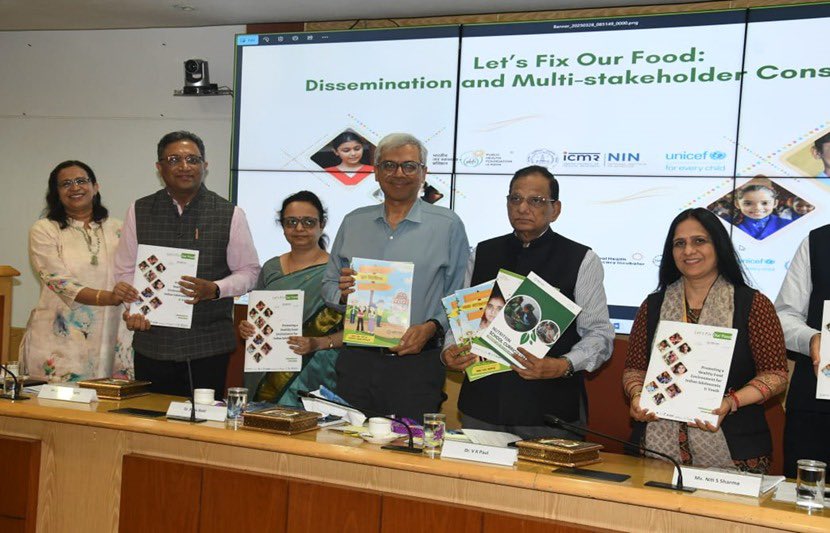India Launches Major Push to Tackle Adolescent Obesity Through LFOF Initiative
The event marked a milestone in the country’s fight against poor adolescent nutrition, particularly amid growing concerns over the availability, accessibility, and marketing of unhealthy food products.

- Country:
- India
In a significant move to combat the escalating crisis of adolescent overweight and obesity in India, the Let’s Fix Our Food (LFOF) Consortium convened a major dissemination and stakeholder consultation at the Indian Council of Medical Research (ICMR) headquarters in New Delhi. The LFOF Consortium, spearheaded by the Indian Council of Medical Research-National Institute of Nutrition (ICMR-NIN), the Public Health Foundation of India (PHFI), and UNICEF India, brought together a wide array of national and international partners to unveil key findings, policy briefs, and tools aimed at transforming food environments for India’s youth.
The event marked a milestone in the country’s fight against poor adolescent nutrition, particularly amid growing concerns over the availability, accessibility, and marketing of unhealthy food products. The initiative comes at a time when data show a worrying rise in obesity rates among adolescents — a trend with serious implications for the future burden of non-communicable diseases (NCDs), economic productivity, and overall national well-being.
A Call to Action from National Leaders
Dr. V.K. Paul, Member of NITI Aayog, and Dr. Rajiv Bahl, Secretary, Department of Health Research and Director General of ICMR, officially released key policy briefs and nutrition literacy resources in the presence of Dr. Bharati Kulkarni, Director of ICMR-NIN. These resources are the product of over two years of rigorous research, youth engagement, and cross-sectoral collaboration.
“The rising burden of overweight and obesity among adolescents is an emerging public health crisis,” said Dr. Paul. “If we do not act now, we risk long-term consequences for both individual health outcomes and national productivity. The LFOF Consortium is taking a leadership role in providing the evidence and strategic direction needed to build healthier food systems for our young people.”
Dr. Rajiv Bahl emphasized the urgency of multi-layered strategies to create enabling environments for healthy choices. “Adolescent nutrition must be seen as a national imperative. Evidence-based actions — such as reasonable restrictions on advertising unhealthy foods, fiscal measures like taxation on foods high in fat, sugar, and salt (HFSS), and programs to boost nutrition literacy — are critical for protecting the health of our youth.”
Scientific Evidence Meets Youth Voices
Dr. Bharati Kulkarni highlighted the role of youth engagement and science-driven advocacy in shaping impactful policies. “We must prioritize both robust research and proactive communication strategies. The LFOF Consortium’s work offers important insights that can empower adolescents to make healthier, more informed food choices,” she stated.
One of the event’s highlights was the presentation of findings from over 163,000 youth responses collected through the UNICEF-supported U-Report digital platform. These youth voices revealed key concerns about food availability, misleading marketing, and the lack of healthy options in schools and communities. Two adolescent representatives — a girl and a boy — shared personal reflections on the challenges they face in navigating an increasingly obesogenic food environment.
Key Releases: Policy Briefs, Education Tools, and Youth Engagement Models
The consultation witnessed the release of several critical documents and tools, including:
-
Policy Briefs focusing on youth rights to healthy food, advertising regulations, fiscal policies such as taxation on HFSS foods, and strategies for behavior change communication (SBCC).
-
A Model School Nutrition Curriculum, designed to integrate comprehensive food and nutrition education into school syllabi.
-
A Food Label Reading Comic Book aimed at promoting skill-based nutrition literacy and helping adolescents understand food packaging and ingredients.
These resources are intended to support state and national policymakers, education departments, and health professionals in crafting holistic programs that embed healthy eating practices into the daily lives of young people.
Multi-Sectoral Engagement and Roadmap Ahead
A robust panel discussion during the event brought together senior officials from the Ministry of Health and Family Welfare (MoHFW), Food Safety and Standards Authority of India (FSSAI), Directorate General of Health Services (DGHS), Ministry of Education, Central Board of Secondary Education (CBSE), WHO, UNICEF, IFPRI, PHFI, Resolve to Save Lives, and other organizations. Together with school students and teachers, participants deliberated on advancing multi-sectoral collaboration to implement practical interventions in homes, schools, and public spaces.
Panelists agreed on the need for “double-duty actions” — strategies that address both undernutrition and overnutrition — as essential components of national nutrition programs. Fiscal measures such as health taxes on sugary beverages and HFSS products were strongly supported, alongside calls for clearer front-of-pack labeling and tighter controls on advertising targeting young audiences.
About the LFOF Consortium
The Let’s Fix Our Food (LFOF) Consortium is a collaborative, multi-stakeholder initiative led by ICMR-NIN, PHFI, and UNICEF India. It aims to reshape India’s adolescent food environment through evidence-based policy advocacy, youth empowerment, nutrition education, and regulatory reform. The consortium adopts a comprehensive approach, recognizing that changing food environments requires not just scientific data but also youth participation, public awareness, and strong intersectoral partnerships.
By placing adolescents at the center of the conversation, the LFOF initiative is helping shape a healthier, more informed generation ready to make better food choices — and ensuring that India’s food systems are aligned with public health goals.
Next Steps
The consortium now plans to scale up its interventions through collaboration with state governments, launch pilot implementations of the model school curriculum, and support the national rollout of youth-driven advocacy campaigns. With UNICEF and PHFI providing ongoing technical assistance, the LFOF Consortium is set to remain a central force in India’s nutrition landscape.
- READ MORE ON:
- Let’s Fix Our Food
- Indian Council of Medical Research
- NITI Aayog










